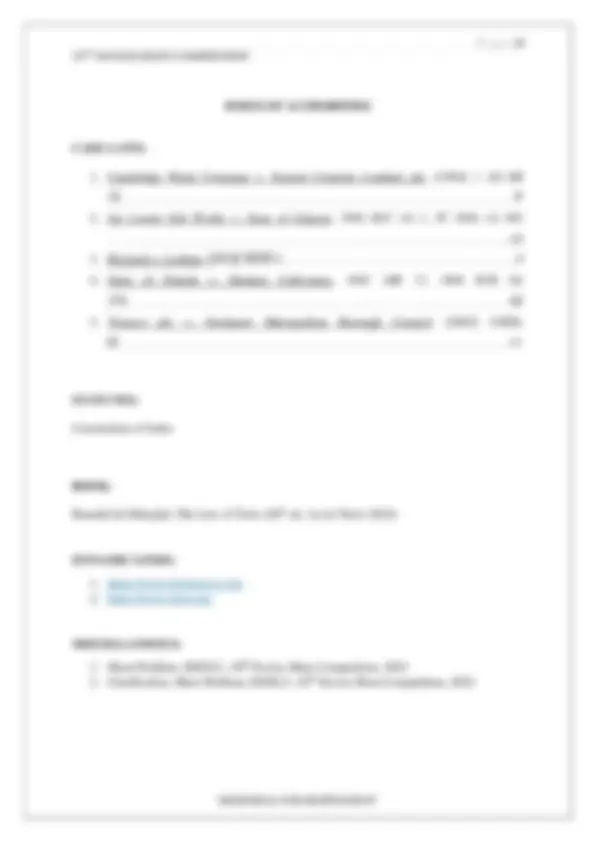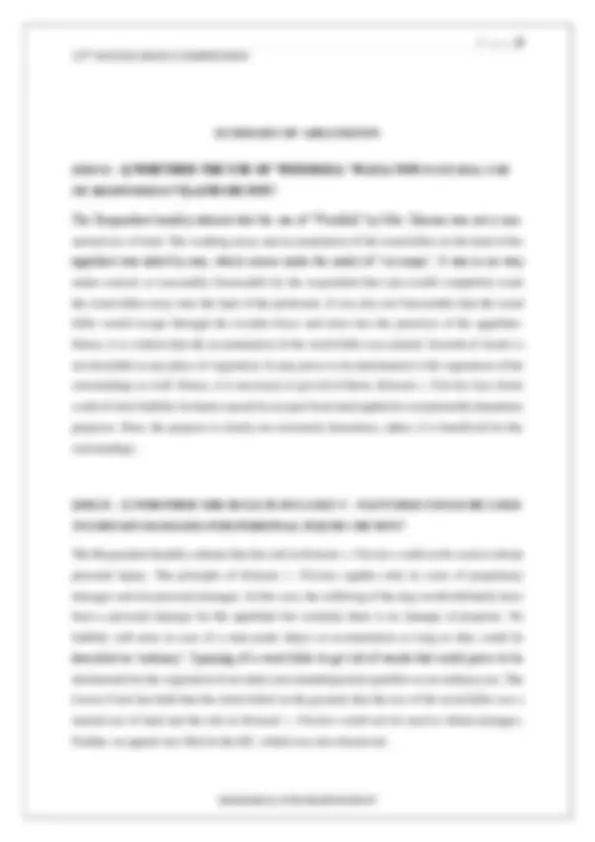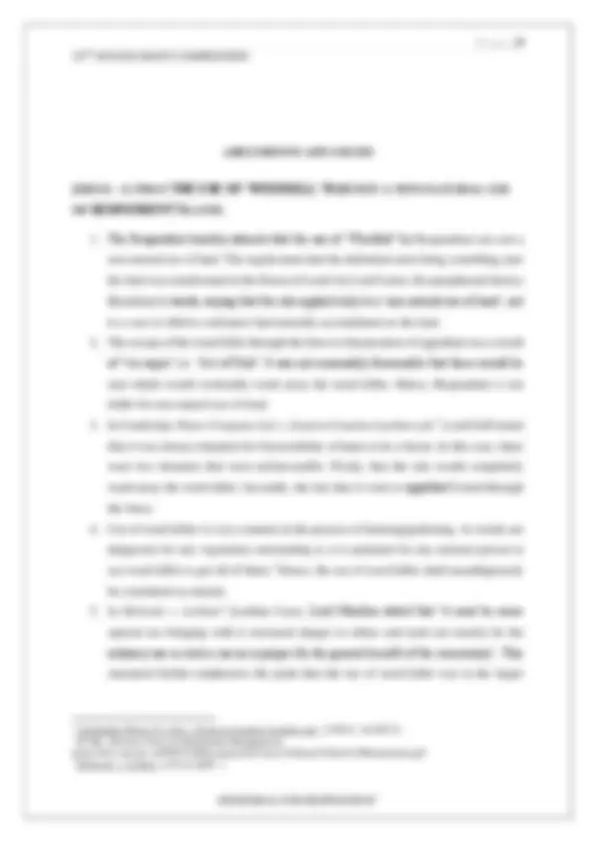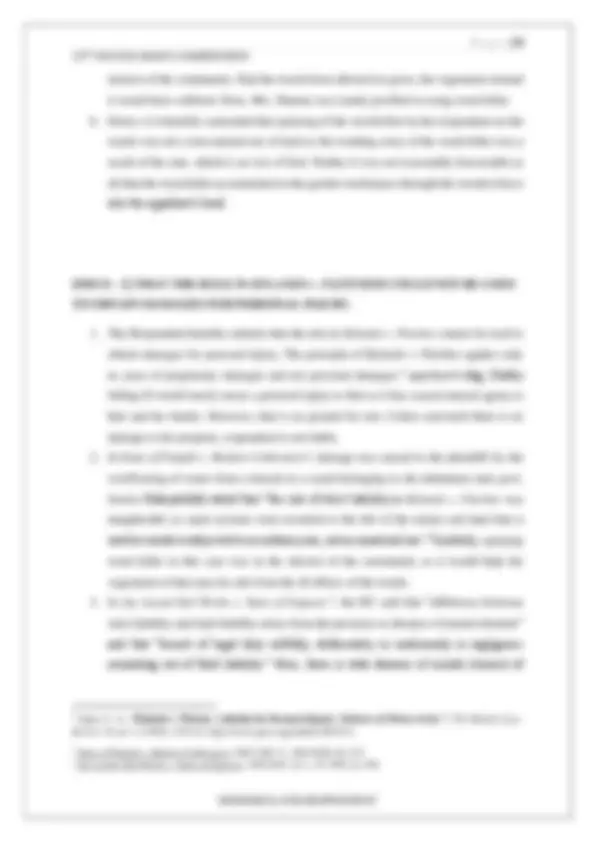








Study with the several resources on Docsity

Earn points by helping other students or get them with a premium plan


Prepare for your exams
Study with the several resources on Docsity

Earn points to download
Earn points by helping other students or get them with a premium plan
Community
Ask the community for help and clear up your study doubts
Discover the best universities in your country according to Docsity users
Free resources
Download our free guides on studying techniques, anxiety management strategies, and thesis advice from Docsity tutors
MEMORIAL ON APPELLANT AND ARTICLE 136 F MEMORIAL ON APPELLANT AND ARTICLE 136 F MEMORIAL ON APPELLANT AND ARTICLE 136 F MEMORIAL ON APPELLANT AND ARTICLE 136 F
Typology: Lecture notes
1 / 12

This page cannot be seen from the preview
Don't miss anything!







10 TH^ NOVICE MOOT COMPETITION REGISTRATION CODE: 22LLB 10 TH^ NOVICE MOOT COMPETITION, 2022 BEFORE THE HON’BLE SUPREME COURT OF INDIA IN THE MATTERS OF MR. OBEROI……………………………………………………………………APPELLANT VERSUS MRS. POOJA SHARMA……………………………………………..……….RESPONDENT MOST RESPECTFULLY SUBMITTED BEFORE THE HON’BLE JUDGES OF THE SUPREME COURT OF INDIA COUNSEL ON BEHALF OF THE RESPONDENT WRITTEN SUBMISSION ON BEHALF OF THE RESPONDENT
10 TH^ NOVICE MOOT COMPETITION INDEX OF AUTHORITIES CASE LAWS:
10 TH^ NOVICE MOOT COMPETITION STATEMENT OF JURISDICTION The appellant has approached the Hon’ble Supreme Court of India to hear and adjudicate over the matter under Article 136 of the Constitution of India. The respondent humbly accepts the jurisdiction of the Hon’ble Court under the said provision. The provision under which the appellant has approached the court is read herein under as follows. Article 136: Special leave to appeal by the Supreme Court
10 TH^ NOVICE MOOT COMPETITION ISSUES RAISED THE RESPONDENT HUMBLY SUBMITS THE FOLLOWING ISSUES BEFORE THE HON’BLE COURT FOR CONSIDERATION: [ISSUE - 1] WHETHER THE USE OF ‘WEEDKILL’ WAS A NON-NATURAL USE OF RESPONDENT’S LAND OR NOT? [ISSUE - 2] WHETHER THE RULE IN RYLANDS V. FLETCHER COULD BE USED TO OBTAIN DAMAGES FOR PERSONAL INJURY OR NOT?
10 TH^ NOVICE MOOT COMPETITION SUMMARY OF ARGUMENTS [ISSUE - 1] WHETHER THE USE OF ‘WEEDKILL’ WAS A NON-NATURAL USE OF RESPONDENT’S LAND OR NOT? The Respondent humbly submits that the use of ‘Weedkill’ by Mrs. Sharma was not a non- natural use of land. The washing away and accumulation of the weed killer on the land of the appellant was aided by rain, which comes under the ambit of ‘vis major’. It was in no way under control, or reasonably foreseeable by the respondent that rain would completely wash the weed killer away onto the land of the petitioner. It was also not foreseeable that the weed killer would escape through the wooden fence and enter into the premises of the appellant. Hence, it is evident that the accumulation of the weed killer was natural. Growth of weeds is not desirable in any place of vegetation. It may prove to be detrimental to the vegetation of the surroundings as well. Hence, it is necessary to get rid of them. Rylands v. Fletcher lays down a rule of strict liability for harm caused by escapes from land applied to exceptionally hazardous purposes. Here, the purpose is clearly not extremely hazardous, rather, it is beneficial for the surroundings. [ISSUE - 2] WHETHER THE RULE IN RYLANDS V. FLETCHER COULD BE USED TO OBTAIN DAMAGES FOR PERSONAL INJURY OR NOT? The Respondent humbly submits that the rule in Rylands v. Fletcher could not be used to obtain personal injury. The principle of Rylands v. Fletcher applies only in cases of proprietary damages and not personal damages. In this case, the suffering of the dog would definitely have been a personal damage for the appellant but certainly there is no damage of property. No liability will arise in case of a man-made object or accumulation so long as they could be described as ‘ordinary’. Spraying of a weed killer to get rid of weeds that could prove to be detrimental for the vegetation of an entire area unambiguously qualifies as an ordinary use. The Lower Court has held that the claim failed on the grounds that the use of the weed killer was a natural use of land and the rule in Rylands v. Fletcher could not be used to obtain damages. Further, an appeal was filed in the HC, which was also dismissed.
10 TH^ NOVICE MOOT COMPETITION interest of the community. Had the weeds been allowed to grow, the vegetation around it would have suffered. Here, Mrs. Sharma was totally justified in using weed killer.
10 TH^ NOVICE MOOT COMPETITION maliciously breaching her legal duty, which clearly signifies that there has been no negligence on the part of respondent. The sole purpose of respondent behind spraying the weed killer was to get rid of the weeds growing around her Tulip buds, and not to interfere in the property of the appellant. This testifies the innocence of the respondent and rules out the possibility of negligence.